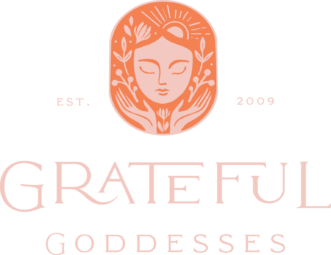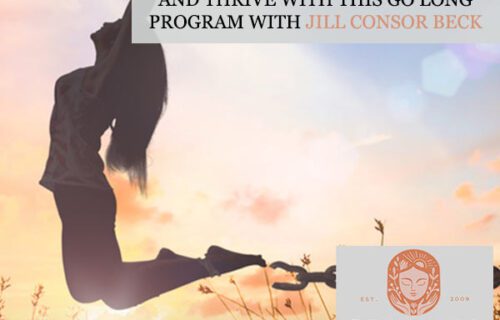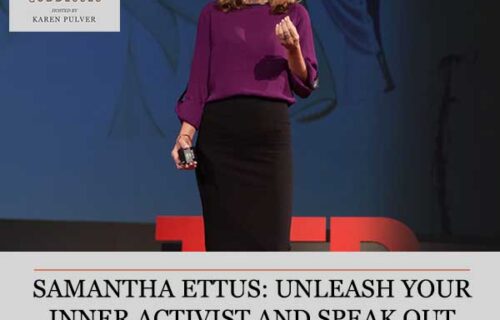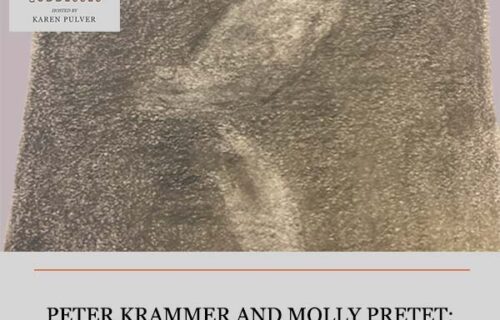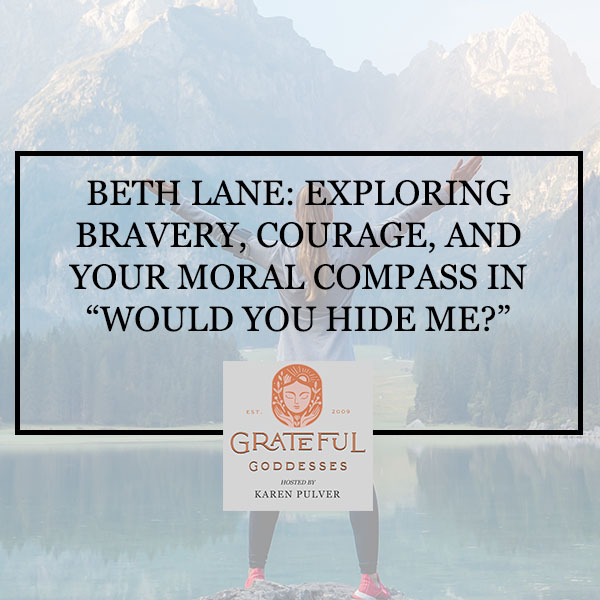
Beth Lane: Exploring Bravery, Courage, And Your Moral Compass In “Would You Hide Me?”
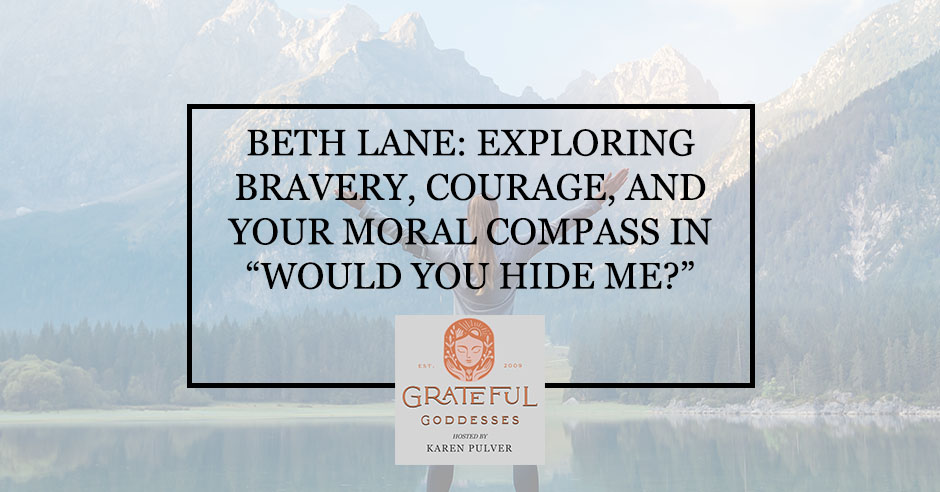
What kind of human being do you want to be walking on this Earth? What is your moral compass and what are your humanitarian objectives in life? What have you been taught by your parents or have you learned along your life journey? Listen on this podcast to Film writer, and director Beth Lane as we open up the conversation about her upcoming Documentary “Would You Hide Me?” The story of Beth’s journey to discover and unpack the bravery and courage of Arther and Paula Schmitt, a couple who hid Beth’s mother and siblings during World War Two. The Documentary scheduled to be released in May 2022 tells the story through the lens of the Schmitt family who had the courage to hide Beth’s mother and siblings as well as another mother and daughter for two years at their farm at risk of being murdered themselves if found out. Our conversation with Beth will hopefully open your eyes to the examination for yourself of the question “would you hide me?” In times like these where revisionist history is occurring and many Holocaust survivors’ stories are being put in the camp of archaic history. Beth brings to light how we can have these conversations of “what would you do” in a non-confrontational way and we can stay present and learn what made us act and believe the way we do. What were we taught and what do we teach our children.
—
Watch the episode here
Listen to the podcast here
Beth Lane: Exploring Bravery, Courage, And Your Moral Compass In “Would You Hide Me?”
Beth Lane is the writer, producer and director of the documentary feature film, Would You Hide Me?, which explores the story of her family’s survival as Jews living in Germany during World War II. The film is both a professional milestone and a personal quest to immortalize this incredible story. Years after beginning production, the Would You Hide Me? The team plans to premiere the film in May 2022. Beth hopes that her film can help educate about what can result when movements based on prejudice, hate and racism are allowed to grow without unequivocal widespread condemnation. Welcome, Beth. Thank you for joining us.
It’s my pleasure.
What do you think about what I said as a parent? It was not always taken the right way but I truly believe in that. I still tell my kids.
There are always varying degrees of lying and why we lie. We lie all the time. Anybody who says they don’t lie is lying. We lie to ourselves, “I’ll have one more bite. I weighed that yesterday.” There are so many different ways that we can extrapolate how we lie in life. In terms of what you’re teaching, it’s like, “Why are you teaching that it’s okay to lie? What is behind that?”
Maybe it’s not necessarily the negative connotation of lying but being that vault or person that is able to hold that secret for someone.
The word lying intrinsically has a negative connotation. Even in 2022, a white lie is even a heavier negative connotation because then you start to look at why we use the adjective white to talk about lying. “A white lie is okay but a black lie isn’t.” This is 2022. We are post-George Floyd. We got Martin Luther King Day coming up. There’s more than the action of a white lie but then there’s the nomenclature of a white lie that is something that in this world we have to unpack.
What you’re saying is not lying. What you are trying to instill in your children is that we all want to be truthful and factual but if you don’t reveal every single fact about the circumstance and the conversation so that you’re sparing somebody else’s feelings perhaps, it’s not that you want to omit the truth. You want to either spare someone’s feelings by not telling them that they were an abject failure with the leadership of how they led the baton pass.
It’s going to hurt their feelings.
Let’s be sensitive. Let’s have empathy for people. We’re in this world together trying to do the best job that we could do. That falls into that bucket a little bit about what you’re talking about. In terms of the secret and what Arthur, Paula Schmidt and many others along the way did for my family, that’s a whole different conversation. To me, that doesn’t even fall into the camp of lying. It falls into the camp of, “What kind of human being do you want to be walking on this Earth? What is your moral compass? What are your humanitarian objectives in life? What have you been taught?”
I so would love to know Arthur and Paula Schmidt’s story. What were their parents and siblings like? They came to this place in their lives where they were willing to risk their lives potentially to take care of another family. Even though my film Would You Hide Me? doesn’t talk about the other things that they did in their life, my mom and her siblings were physically hidden in plain sight for two years on their farm 60 kilometers East of Berlin. They also hid another family. There was another mother and a child there.
What kind of human being do you want to be walking on this Earth? Share on X
Interestingly enough, there was very little if any interaction between my mom, her siblings, this other mother and her child. Who knows why? Who knows what the stakes of their circumstances were? Were they Jewish? I have no idea. There are so many pieces to that puzzle that we will never know. My mom and her siblings have few memories and what memories they do have I’ve been able to tease out of them and extract them to tell a story that people can follow. Going back to how you hold a secret like that, is that a lie if you’re holding a secret to protect human life?
That’s what I was thinking about and why I thought about lying. It’s got a bad connotation but it’s more about holding that secret for someone and what’s at stake? I would like to invite our featured goddess, Camille, to join us in this conversation with you, Beth. Camille, you’re in the film industry family. Can you share a little bit about that? You have some questions for Beth.
My father has worked in the film industry but also in civil rights. He was part of SNCC and so on. I always grew up with an understanding of us working together. Even with him being part of SNCC, there were a lot of Jewish people that were involved with his organization. I’m curious. With your experience working in the film industry, who was there that was helping you? Why was it so important for you to share this story as a film as opposed to a book or different mediums?
I’ve known this story my whole life. I never felt it was my story to tell because I didn’t live it. There came a point in my adult years when I started to write about it. I took a stab at writing two different plays. One was a play with me as the central character and a supporting piece of separate characters. It was called the Groaning Board. It was my attempt to understand who my mother’s biological mother was. She was murdered at Auschwitz on December 1st, 1943 at 11:00 in the morning. I’m trying to understand the other aspects of her life.
She was murdered because she was a Jew and also, she helped hide and get people through the underground to try and get them out of Germany. She would secure visas and passports for other people to help get them out. That takes a lot of chutzpah to do that. You’ve got seven kids and a husband yet you’re putting part of your priority and helping other people get out. One might ask, “Why wouldn’t you try and get your family out?” They didn’t have the means. You had to have money to get out of Germany. I started to write about that.
Honestly, it felt self-therapeutic. It didn’t feel like it was landing for an audience. I also wasn’t getting the artistic support from the mentors I was working with at the time that would help me take it out of the realm of self-therapy and the realm of a story for other people. Regardless, I then wrote about it again many years later in 2015. I’ve written about it three times. However, in 2017, my mother, father, sister and I went to Boren, which is the town where they were hidden.
We went to the farm where they were hidden and were hosted by the town historians. The town historians had a surprise for us. They invited the grandson of the farmers to come and meet us. That was a watershed moment in all of our lives. At that time, my mom was probably 78. I looked to the left and right. I was like, “Where is the fucking film crew?” I couldn’t believe it. I was meeting the grandson of this figure in all of our imaginations. Even though he was a real person to my mom and her siblings at one time, he died in the ’50s. There was never any contact all these years later.
For me, as a child, this was a fictitious person who did this wonderful and noble thing. It’s very easy to look at the Holocaust from the lens of the civil war like, “It’s hundreds of years ago.” It’s not so much. Frankly, the civil war isn’t even that long ago either but people have started to put the Holocaust into that camp of archaic history. It’s not. I made a vow that day. I was lucky enough. I happened to be in graduate school at UCLA. I was enrolled in the School of Theater, Film and Television. I wanted to get my Master’s in Theater because I wanted to teach at the university level.
I came running back to campus after meeting this grandson who is my brother’s age. My brother is two years older than I am. I’ve always thought about this story through the lens of my family but meeting him made me realize, “Let’s look at the reverse shot of this. What about the lens of the Schmidt family? Look at it that way.” That was truly the portal that took me out of self-therapy and all that thing. I was seeing it from somebody else’s shoes and eyes.
That’s what made me have the courage to say, “Mom and aunties, are you going to let me tell your story because you aren’t doing it? This has to be told.” Cinema gives you so much license to not change the truth but to tell the story. With a story like this, you’re missing a lot of parts. You can’t go back and film from that time. Nothing looks the same anymore. How do you play with that? I love live theater and I do think there is a live theater piece. I wound up writing a one-person show about nine months after I started the pre-production for the film.

Whether or not I ever produced that one-person show remains to be seen. Cinema gives you so many options for storytelling in a multigenerational way. There’s no question that there is a such a broader reach when it comes to film and television than there is at the theater but the theater will hold this gem at some point in time in a way that has the experience of a collective audience breathing in the same moment that you’re breathing as you’re sharing a story like this.
I do think there’s an eBook that we will come out with. There’s so much that we can’t put in the movie. As we have been producing the film, we’re like, “Let’s not go there and put it in the eBook.” We’re already planning and preparing to have an eBook whether it ever gets printed or not. Who knows? It doesn’t matter to me, especially because the younger generation doesn’t love paper the way I do. I have a library. It’s online but I go to my library and open up the book. I love that. We also intend to have a museum exhibit at some point and have an interactive museum exhibit.
Perhaps we will film the one-person-show in Oculus so that people at the museum will be able to put on a virtual headset and feel like they’re experiencing live theater. That way, we can get to more audiences. There are so many ways that we have been thinking about derivatives of the movie. A lot of people that I work with all want me to turn it into a fiction film. That may happen or not. It certainly is an amazing story for a fiction film. There’s no question about it. We could tell some other things that we can’t tell in the documentary because it wouldn’t hold documentary standards if you follow.
Interestingly, you’re on because it was International Holocaust Remembrance Day, which is different than in April, which is Yom HaShoah to my understanding. I am Jewish. I do not hide that from my viewers. That day every year is more for Jewish people to remember the Holocaust but the International Holocaust Remembrance Day designated in 2005 is for the entire international community and everyone to recognize it and its importance. Camille and I were sharing about how both of us have experienced situations where people have said, “It’s a lot.”
When going back to the word lying, I’ve heard someone say, “The Holocaust is a lie.” When I first moved here from Canada to Chicago, years ago and it came up that I was Jewish, an individual said, “What’s on your head? Where are your horns? Don’t you have little bumps on your head?” I’m like, “What are you talking about?” That was back in 1992 when that happened. I remember telling my parents, “What is she talking about?” My mom was like, “People still believe that.” I’m even hearing about schools not sharing the stories.
In addition, many of the survivors are in their 80s and 90s. They’re dying and leaving this Earth. The stories need to continue to be told. All of that leads me to ask this question. How do you react when you hear people disclaiming the truth of the Holocaust? It angers me. My platform is a small but mighty platform. To the people reading, whoever you are, you’re part of this community. We come on here to be entertained and learn lessons. I have this book. I’ve shared Dr. Edith Eger‘s story. She joined us. Do you know her? It’s The Choice.
I know about the book. I haven’t read it yet but it’s on my list.
It’s very important to tell these stories and continue. I do that in my family and with the people I meet and on my platform. By you making this film, it will immortalize bravery and courage and show this to people. How do you feel if you’ve heard people say this to you?
No one has ever said that directly to me. As a Jewish woman, I have skated by in life with very few antisemitic slurs directed at me. I have had some but it’s few compared to what I understand so many other Jewish people have endured. I want to make a distinction or clarification about the difference between International Holocaust Remembrance Day and Yom HaShoah. Yom HaShoah designates the uprising of the Warsaw Ghetto. That is how that observance came to be.
The reason that International Holocaust Remembrance Day came about is that is the anniversary of the liberation of Auschwitz. I could be wrong because I’m not an expert at all but I believe the state of Israel designated Yom HaShoah. I would be lying if I told you who I knew designated International Holocaust Remembrance Day because I don’t know. I can make some assumptions but I don’t know. That’s a good question for me to look up.
How do you hold a secret? Is it a lie if you are protecting human life? Share on X
Camille, I would be interested in hearing your opinions about revisionist history too as a woman of color. It doesn’t hurt me because these people don’t know me. It boggles my mind at the lack of education. There’s the ignorance and the sensitivity to think that you know more than what the history books are telling us. With that being said, are all history books accurate? Who writes the history books? Let’s talk about the country of Poland, which has the most revisionist history of any country in the world regarding the Holocaust.
They have passed laws stating that if you say that Poland was complicit in the Holocaust, you can be fined and arrested. There was an excellent op-ed in the New York Times about revisionist history. One of the things that I learned from reading this particular op-ed and I hadn’t ever gone down this pretty particular rabbit hole is it is very important that we honor the Righteous Gentiles. There’s no question about it. There’s no question that Arthur and Paula Schmidt, who have received this designation As Righteous Among the Nations, deserve it.
I would not be here talking to you had they not done what they did. It’s plain and simple. At the same time, what Poland is doing my understanding from this particular op-ed is that they are placing the suffering of the Polish people at the same level as the suffering of the Jews even to the point of Auschwitz, which is a state-funded museum funded by the state of Poland. Even at Auschwitz, the op-ed posits that Polish people who suffered were just as tormented as the Jewish people who were murdered.
There’s a real problem there. You can’t honor people who did a humanitarian thing at the expense of the atrocity of what happened to the Jewish people, the Gypsies, the homosexuals or any undesirable. This revision is history is a very dangerous thing. It is seeping into the culture here in the United States of America in a blasphemous way. It needs to be condemned at every turn.
You can no longer make a joke at the water cooler. Do you know you’re scrolling through Instagram and you see Reels? I don’t do much on social media at all, I must confess but I do get a kick out of America’s Funniest Home Videos. If I need to decompress, I will scroll through Instagram Reels because they’re pratfalls. Things are bouncing into trays and falling into the water. It’s stupid but it does make me laugh. After a long day of dealing with World War II, I need to laugh.
Do you see the Karen videos?
I don’t.
My name is Karen. I’m Jewish. It’s not antisemitism but it certainly puts me in an awkward spot when I’m at Starbucks and they say, “What’s your name?” I’ll say one of my kids’ names because I don’t want them saying, “Coffee for Karen.” Everyone is looking at me about that crazy Karen.
After reading this article, I’m scrolling through and I come across one of the little Friends’ Reels. I love Friends. It’s so funny. I can’t sit through a whole show of Friends but I love the little sound bites in the Reels. There was this soundbite of David Schwimmer. His director and producers gave him a script where he had to make a joke that invoked Auschwitz. I was like, “Oh, my god.” When that came out at the time, I’m sure I would have laughed at it too but then we have come to terms with what words can do.
What has happened with television and cinema, the broad reach and the superb storytelling that’s being told with 13th, Amend or so many other programs are we have all become much more keenly aware of when a fraction of the population is being dismissed through humor. We have to have humor and be able to tell jokes. Otherwise, why are we on this planet? Come on. Is it at the expense of revising history?
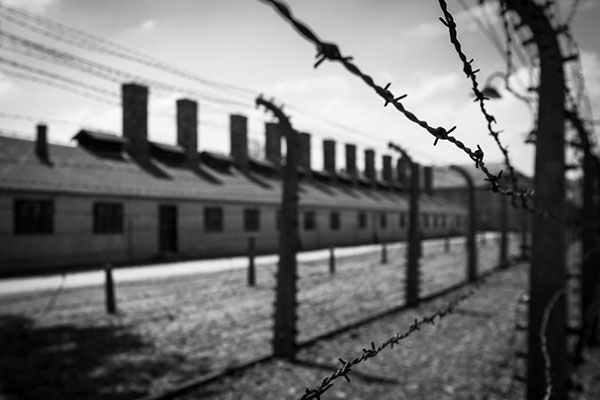
With all of my friends and colleagues in Hollywood and writing theater, opera, photographers and artists, we have to be careful with how we want to use our platform as artists. I’m certainly using mine to be an activist through the arts. I worry about going to marches at this point with the gun laws that we have in this country. Why would I want to put myself in harm’s way? There’s so much gunfire happening, many ridiculous laws and a lack of background checks. We’re going off in these different directions. This is my way of participating in the conversation.
Did you see the Larry David episode with the shoes?
I haven’t. What did Larry do?
I love Larry David. He went to a museum and then took his shoes off outside because they were bothering him. When he went into the museum, he took a pair off the pile of shoes and put them on. That was supposed to be funny. I‘m watching it thinking, “I get the humor but also, no, Larry.”
This is why I don’t watch Larry David. I should be careful.
I was torn. I was like, “What is going on here?” I’m thinking, “Is this funny? It’s not funny.” I wanted to bring that up. It’s a very slippery slope.
As a Black woman working in the entertainment industry, seeing the images and the way they like to portray Black women, it’s a slippery slope.
It goes down that path of how my kids know full and well that if I were ever to hear them use the N-word, that’s unacceptable on every single level. They have taught me, “Mom, you have to appreciate that the N-word has been reappropriated by the Black culture for their use. They’re allowed to use that. If they want to say that about themselves, they can because they’re taking the word and making it a good thing. They’re making it like bro instead of this negative thing.” I don’t agree but there is a whole generation that believes that.
Who am I to tell a person of color what they can or can’t say about their culture? Whether it’s derogative or not, who am I to tell them? The only thing I can do is to tell my kids, “Don’t you ever.” I imagine that Larry is not only an icon in the industry and has a lot of history behind him. When he does a horrible thing like that, which to me is tasteless, he does have a canon and a body of work behind him that supports that he is a comedian and a Jewish comedian.
It’s shown in the episode because Larry, that persona, would do that crazy thing. He’s a privileged man and has no regard for what it represents. It has shown it like, “Larry, what are you doing?”
Cinema gives you so much license to not change the truth but to tell the story and fill in the parts that are missing. Share on X
Is it the best teaching moment? Is it the best way to teach that? That’s my question.
I think about Dave Chappelle. When he had his show, he realized it was a different kind of laughter that was coming from some of his jokes. Maybe Larry was thinking in that same way, “I’m making fun of this in a way that other Jewish people would see how horrible it is but yet funny.” It’s a dark sense of humor. At the same time, there comes a point when you might realize it wasn’t worth the laugh because Dave Chappelle walked away from $50 million because he was like, “It’s not worth it to throw my people under the bus for the sake of a laugh.” It’s that type of thing.
Camille, you grew up in Germany. Can you tell us a little bit about your experience? I don’t know if you know that path.
I grew up in Germany, Turkey and Holland. I had the benefit of going to Anne Frank’s house where she was hidden. I’m thinking about what your story represents even with everything that’s going on. When I lived overseas, it didn’t seem so segregated as it is here. You go to church at different places. You’re separated so much that it’s hard to respect each other’s cultures because they divide and conquer in a way where you don’t understand their culture and why they’re doing certain things so it must be wrong and all this different stuff.
I’m wondering. From your experience with working on this film, doing these different things, traveling and meeting the Schmidt family and so on, what do you think would be a great way to try to build that unity here? What can we do? I’m not marching either because of gun laws. I live in the South. There’s no way for me because I’m a mother.
I feel the same way. It’s a scary thing but you want to speak up. That’s why I’m using this platform as I can but to go out and march, I would be scared.
I say that I don’t march and then I wind up marching again.
I admit. I did march before COVID. That’s the other part of it. I marched at a lot of different events.
How do you feel like we can do this?
That’s what you’re doing, Karen. That is a huge step toward people coming to the conversation and the table. Let’s talk about it. Can we talk about it without the polarization of politics? Can we talk about what happened to a person or a family? What was the road that went down? My family has both. They have a family member that was murdered and saved. We have both sides of the coin. Also, my mom’s mother’s extended family were all murdered too but in terms of her nuclear family, it’s extraordinary that all seven siblings and their father survived.
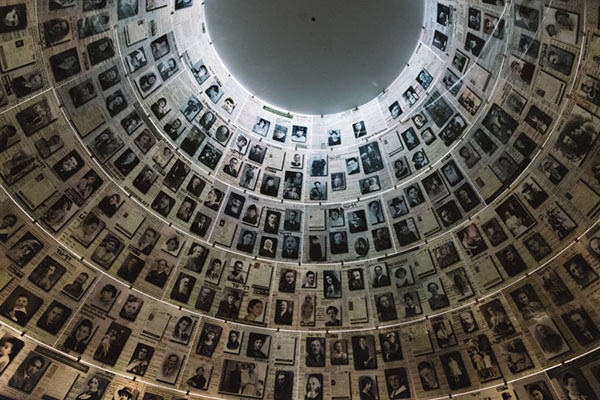
We will talk more about the story. You have to share how they were put in different foster homes.
To create unity, first of all, we have to be willing to open up the conversation in a non-confrontational way. The best way to do that is either we come front and center and have these podcasts, go on panels, write books or movies or these different ways of engaging. The other opportunity is when something does come up in a conversation that feels negative or unconscious. I do believe that at the heart of every human being, they are a good person. It’s what were they taught. Can we interject, state our opinions and stand our ground in a way that isn’t confrontational that invites them into the conversation?
Is it possible for me to say to someone who says something revisionist or offensive, “I never looked at it that way. Can you tell me more about that?” You’re inviting them to speak more. I am an actor by trade. This is the first film that I’m directing. As an actor, I’m an empath. My skillset is to be responsive and allow all of my emotions to bubble to the surface so that they can react appropriately to what the script is saying they want the character to do. My job is to realize the vision of the writer. Hopefully, the director is directing me in such a way that it realizes the vision of the writer.
These conversations can be hard, especially for actors because your hair is sticking up on the back of your neck and you’re freaking out like, “I can’t believe you said that.” If we can stay present with that person, not go into our agenda and truly understand, “What made you say that? Where did you learn that? Why do you think they learned it that way?” Hopefully, they will ask my opinion. Maybe they will or won’t. It’s somewhere in that conversation because of who I am, I’m going to say what I need to say but hopefully, it will be in a way that is an invitation to re-examine what they might have stated in the first place.
Even the conversation that I had back in 1992 about my horns or where are they, the individual that said this to me was Mormon. I didn’t know a lot about her background. It opened the doors. I was like, “Feel my head. There’s nothing there. Who told you that?” That’s what she learned. We had this conversation that was an educational experience. It was a teachable moment that as a teacher I always look for. We’re going to briefly get into the story if that’s okay. You mentioned it a little bit but I want individuals to a look at your website and give to the funding of your movie.
That’s how I stumbled upon you. I know your sister here in Chicago. I’m Facebook friends with her. You came up on Facebook in 2021. It was instant, “Will you donate towards this fundraiser?” I’m like, “Yes. I’m clicking.” I just heard the title and got the gist of the story. That’s how I met you and read your story. Can you tell a little brief synopsis of the story and then how people can contact you? It’s exciting. Your movie is supposed to be out in March 2022.
It’s supposed to be. First of all, I have so much gratitude to you, Karen, for inviting me on and secondly, to be one of those kinds of people that sees something in the news, on Facebook, which I suppose is the news or in society and says, “I’m going to participate in that and be an engaged participant in combating antisemitism.” I’m very grateful because were it not for people like you, we wouldn’t be where we are with the film. We are in what we call the fine cut stage.
We’re about halfway through fine cutting a 90-minute film. It’s exciting for me to even say that we’re at the fine cut. It has taken us so long to get here but that has bumped our trajectory of when we’re going to release the film in many more months. Different from the fine cut, we do have a final cut internal self-imposed deadline for May 20th, 2022, which is the 76th anniversary of the Weber siblings emigrating from Germany to America in May 2022.
We did a private screening of a rough cut in May 2021 for the 75th anniversary. I have every intention of doing another private screening for them in Chicago in May 2022 for the 76th anniversary because how many more anniversaries are the four remaining siblings going to be around for? I say that most distantly because the very thought of my mother not being around is impossible. I say that with reverence because we never know what tomorrow brings.
The film is about the daughter of a Holocaust survivor, Beth, who’s the filmmaker. That’s me. The film is about my quest to follow my Uncle Alfons’ written history. It’s called A Brief History of the Weber Siblings. I took this document and followed around Germany to try and recreate their journey about how they existed and got out. Half of the film takes place during World War II but the other half of the film takes place after the liberation.
Revisionist history is a dangerous thing. Share on X
Especially being my first documentary, I had no idea what the movie was going to be. All I knew was I had this document. It was my roadmap. I was going to go around to all these places and film. We have over 200 hours of footage. You don’t know what the story is going to be until the footage tells you what it’s going to be. I didn’t know for quite some time that half of the film was going to be about post-liberation. It has been exciting to unpack that and understand how the war affected all of them and how they went on to live their lives.
We end the film at the point where they come to America. They were all dropped off in different foster homes. The mini-series is what happened. Was the trajectory of siblings’ life? How did each sibling manage from 1946 to 2022? We welcome any participants to help us in the funding of this film for all kinds of reasons. First of all, you can go to my website BethLane.com or WouldYouHideMe.com and then click on the Donate button.
All over the website, we have links in our bio for Facebook, Instagram and Twitter, which is @BethLaneFilm. Follow us. Please subscribe. We have a newsletter. If you go to BethLane.com, you can subscribe to our newsletter. We don’t send them out on a weekly basis so you’re not going to get spammed. We send them out when we have something newsworthy. There are always donate buttons all over that. We welcome any level of contribution. We have had done from $5 to $100,000.
Every little bit helps, I’m sure.
Not only does every little bit helps but I had a donor say the most beautiful thing to me. He’s a repeat donor. He has donated at this point 4 or 5 times. It’s so heartwarming to me that he does this. It’s so generous. Even more than the money, he’s taking the time to do it. That is what I find to be so profound and moving. He said to me, “Thank you for giving me the opportunity to contribute.” I’m like, “What a kind and beautiful thing to say.”
I do believe that when we’re making the movie that we’re making, we need all the financial support we can get. If anybody reading knows family foundations, grant opportunities and stuff like that, you can email me through the website. Please, let me know. We’re always pursuing everything all the time. I do believe that people need an outlet to be able to be part of the conversation. Please, donate to the United States Holocaust Memorial Museum in DC and the Holocaust Museum in Los Angeles for sure.
Donate to these places if you would like to help us get what I hope will be a seminal teaching tool into communities for our community engagement and educational outreach as part of our impact campaign. Once the film is launched and all the fun festivals are over, we make a sale and we get lucky enough to potentially be on a streaming platform. Once all that is over, there’s a shelf life for everything. I mentioned 13th before. People aren’t watching 13th as much as they were the month that it came out. What happens to this movie? This movie needs to get into schools, houses of worship and museums globally to stimulate the conversation.
If that is going to happen, we need as much engagement as possible. It’s not quite yet but people say to me, “If you make this giant sale and people made all these donations, do you have to pay people back? If they’re making a donation, what are you going to do with all that money?” We’re going to turn it into a family foundation so that we can get all this material to schools in Belgium, Lithuania, Tennessee or wherever we can get it. That’s the goal of what the funding would enable.
Also, I would imagine it’s encouraging those who have not told their story to tell their story. That’s huge.
With the movie being called Would You Hide Me?, I’m curious. What made you come up with that as the title? What was your motivation for that?
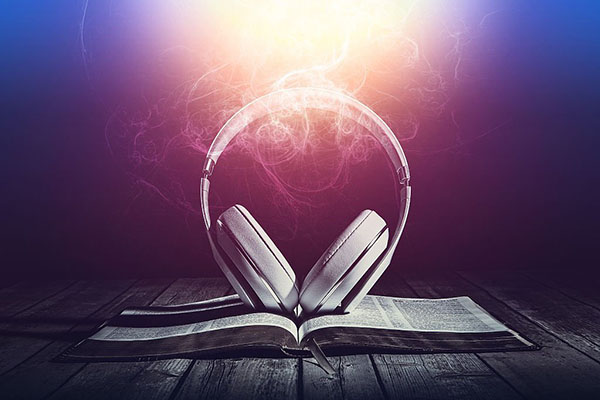
We met the grandson of the farmers in Boren when we went to visit for the first time. We were all saying goodbye. He spoke pretty good English even though it was difficult to understand. I speak no German. He started to tell me his story of what it was like to be raised in East Germany and know this story about his grandfather. He shared something very personal with me and I was like, “How did you come to do that?”
He did something that was truly what a pacifist would do. It’s his story to tell. I’m not going to share it. I said, “How did you learn to be that brave and much of a pacifist knowing that you would be in prison for it?” He was in prison for this pacifist action that he took. I said, “Was it from your grandfather?” He said that first of all, he never met his grandfather. Second of all, he’s quite sure that his father never even knew what his grandfather did.
Not only did Arthur and Paula Schmidt keep this a secret from their neighbors, the community and so forth. Paula was his second wife. She was not the mother of these children. He never even told his kids his whole life. He took the story to the grave. That rocked my world. My first question was, “Is courage and bravery something that is learned? Are you born with it?” One of my wonderful professors at UCLA pointed out to me that it wasn’t the question I was asking and it was slightly distasteful also because it smelled of eugenics.
When he taught that to me, I was like, “You’re right. That’s not the question I’m asking. I have to be very careful with how I am emboldening something that is inherited.” There are a lot of things in life that we do inherit. There’s no question. John Lennon’s son is a brilliant musician the way that John Lennon was a brilliant musician. Things do get passed down. We do carry traits of our ancestors, which was the intention of my question.
Still, walking into a Holocaust film, I have to be careful about that categorization as I was trying to understand what was the question I needed to get to the bottom of. I had a housekeeper for ten years from Mexico. She’s undocumented. I loved her to pieces. I would freak out when she would be late to work. I’m like, “I don’t care that you’re late. That doesn’t matter. I’m panicked living in California in particular that ICE picked you up.”
I know her kids. She’s part of our family. I started to truly explore within myself, “Would I be able to hide her and her children if I needed to?” For me, the answer was yes because if I were to hide her, I’m not going to get murdered for hiding her. That’s truly where the question came from. I honestly would have these moments of thinking, “Where will I hide her? What can I do to protect her from ICE?” We posit the question to other people but the whole point of the movie is for us to ask that of ourselves.
It’s to have that conversation with our children and then their children and to continue that conversation, keep it alive and going.
More importantly, what are the actions that we’re doing in our day-to-day lives as parents and citizens that embody that conversation? We can talk all day long but what are we doing in our lives to be role models that your kids would say, “There’s no question in my mind. My parents would have done that for somebody.” If you just talk about it, they can’t say that. What are you doing in your life? What are we doing in our lives?
Thank you for sharing your story, Beth. It was so interesting because when I was looking through my jewelry box, I stumbled upon a prayer. It says, “B’chol l’vav’cha, uv’chol nafsh’cha, uv’chol m’odecha.” That is part of the V’ahavta prayer, which is translated to, “With all your heart, all your soul and all your strength.” After this in the prayer, it says, “You shall love the Lord, your God.” I saw it and was like, “I have to wear this because this exemplifies you.” With this movie that you’re making, you’re pouring your heart soul and strength.
I’m so honored that you came to share this with us and we had this conversation because I too believe so strongly in education and storytelling. That’s how it keeps things alive. Circling back to what I started with lying, it’s a whole different perspective because it’s not about teaching my kids that it’s okay to lie. It’s more about being that brave, strong and courageous person and having that mentality, “Would you hide someone?” What a conversation starter. For those people reading out there, would you hide someone? Think about it. Thank you for joining us on the show, Beth.
Be careful how we want to use our platform. Share on X
It’s my pleasure. Thank you very much for having me on.
—
Welcome, everyone to our Favorite Things portion with our guest Beth Lane. I did show you this pendant as one of my favorite things. Interestingly, I was talking with my sister. She sent me an article. It’s from The Jerusalem Post. It said that Shema Yisrael pendants were uncovered in an extermination camp on January 27th, 2022. Shema Yisrael in English means, “Hear, O Israel.” That’s on one side and the picture of Moses carrying the tablets on the other.
These were discovered and it got me thinking about what I’m wearing and how words have so much power in how individuals in this extermination camp were holding this message close to their hearts and wearing these pendants. What I also wanted to share is something that I’ve kept on my nightstand for years. I went to the Holocaust Museum here in Skokie, Chicago and took my younger daughter. We walked through and at the end, we had an opportunity to listen to a survivor.
First, my daughter was a little scared. She didn’t quite understand. I said, “Let’s go listen.” We sat in and listened. She told her story. Her name is Sephora. She was held in a potato trough. If you can imagine, she said she was three. She could stand and the ceiling was right there. Her father and uncles who were there had to lie down. They would move every ten minutes. It’s to imagine being there. She survived the Holocaust and told her story.
I ended up bringing her here into the city and to the Chicago public school where my daughter went to. I spoke to the science teacher and said, “Could I have her speak?” The principal came. She spoke, told her story and she gave me a gift. It was this little pouch that she knitted. Inside is $0.18. Those of you who are Jewish will understand that eighteen is a significant number. It’s a Chai pouch. Eighteen means Chai in Hebrew.
“The Chai pouch was made by hand, especially for you. $0.18 is enclosed because 18 is a spiritual number in Judaism. In the Hebrew alphabet, Chai equals eighteen. Chai symbolizes life, luck, health and prosperity. Enjoy. Bat Shalom with peace. Sephora.” She signed it. I lost touch with her. I found this and a large part of me wants to try and find her. I’m a little scared because it has been years but I’m going to do it and search for her again. I keep this on my nightstand and tell my kids about it. That’s one of my favorite things. Camille, would you like to share?
That’s such a beautiful story. I love this book. This is Supreme Actresses: Iconic Black Women Who Revolutionized Hollywood. I look through this book and get inspired again because there have been times when I’m like, “I don’t want to do my podcast anymore. It’s too much work and effort. It’s so much this, that and the other but then how else will people know how hard the people that are onscreen or in films worked to get where they are, how many challenges they had to overcome and how many people were there championing around them and helped them get where they got?”
She was the first Black woman to win an Oscar. She won as the maid in Gone with the Wind. I remember being not able to watch Gone with the Wind because it was so racist. To hear her story and why she did what she did and different things made me be like, “Maybe I’ll watch Gone with the Wind to support her and the fact that she knew that opening the door a little bit by getting in opened the door for more people and women like her to be able to work in front of the camera.” That’s why I brought this book. The writer is from Chicago, Marcellas Reynolds.
I saw this in 2022 on an entertainment show. I may be saying this incorrectly. I hope I’m not. She was not allowed to sit in the audience to receive the award.

The producers had written her acceptance speech for her. She did not read it. She did her own where she made a point of saying, “Thank you for allowing me this opportunity but also, I hope this gives other little girls and women out there hope.”
You’re talking about Hattie McDaniel.
Camille, you’re a podcast. Also, we were talking about a mission that she was involved with. Perhaps you can tell us briefly about that. It’s showing the world your story, talking and having these conversations.
It’s important because so many times, people see the result and assume, “It was easy for them,” not knowing that no matter what you look like, it’s a struggle, especially as a woman in general in film. That’s why I wanted to be here because I’m like, “There’s a female filmmaker.”
You also were involved in the Black Jewish Entertainment Alliance.
I am involved in the Black Jewish Entertainment Alliance. I’m also with the George Floyd Memorial Center. I work with them as well. It’s important for me because my dad was involved in the Student Nonviolent Coordinating Committee. He always instilled that into me, “You have to be involved. The tax you pay for living on this Earth is giving back.”
What other way can I give back to inspire other people to use this platform and film to champion those stories that inspire hope and togetherness as opposed to divisiveness? That’s not where I want to go. I’m married to a White guy. I see the privileges he gets daily. I have to make a point, “We should all be treated that same equal way that he gets treated and the benefit of the doubt.”
Thank you for sharing. I love that book. You should be on the cover of that book. Beth, what did you bring?
Before I even show you what this object is, I know that scheduling our interview took a long time. There were so many things happening that were out of my control. One of which was I even sent you an email that I might have to cancel again because of a funeral. What I’m going to show you is a purse that was given to me as a gift by my very dear friend, Pam Fair Stevens, who died quite unexpectedly. All of these canceled appointments that you and I had is to be sure that I’m here to represent Pam.
Why is Pam so special to this particular show? Why do I want to talk about her? First of all, I’ve known Pam since 1969. We grew up together. She’s a twin. I always wanted to be a twin and have twins. When I got married to my non-Jewish husband, I had a child and then eighteen months later gave birth to twins. We have always had this connection. When Pam learned about the movie and what I was doing, she decided to make it her mission to actively engage in any way that she possibly could with the movie.
She has been a recurring monthly donor for years because she wanted to be involved, be engaged and see it cross the finish line. She is truly the embodiment of what it is that we’re trying to do by giving people opportunities to be activists for the arts. The other thing that I want to share about this object that Pam will get to see is that I wore this purse every day of filming. It’s in the movie. Every time I had it on when we were filming, Pam is in the frame. It’s the most important object to me.
Pammy, I love you so much. I can’t believe you’re not here. She will be in every frame of this movie where this purse is being worn. It’s a cool purse. You open it up and it has all these pockets and stuff. You can put your credit cards in there. There’s a hiding place. Since we’re talking about hiding, you could hide all kinds of things in all these different places. It’s a crossbody bag. It was so funny when we saw it. I fell in love with it and I wasn’t going to buy it. She said, “You have to have it.” She bought it. It’s an expensive purse. It’s not a $50 purse.
It’s so nice that you got to share that. We kept scheduling and different things would happen. You, unfortunately, had two people that passed away close to you. I was like, “The story will come out.” I found it so interesting that it was the International Holocaust Remembrance. My heart goes out to you during this time of loss. Here’s love and light to you. Pam, if you’re watching us, thank you for being a part of the show.
We’re so grateful to you for being in your life and supporting Beth on your journey. May this be a time of remembering those who perished for various causes in life whether it was the Holocaust, during this time of COVID, civil rights or anything. It’s to remember those that have passed on and have hope for the future. I’m giving this speech. It’s coming from my heart and soul. Thank you again, Beth. We’re looking forward to seeing the film. Thank you for joining us. We’re so honored.
It’s my pleasure and my honor to be here. Thank you very much for having me.
Important Links
- BethLane.com
- Camille Kauer
- Dr. Edith Eger – Previous episode
- The Choice
- Donate
- Facebook – Beth Lane
- Instagram – Beth Lane
- United States Holocaust Memorial Museum
- Holocaust Museum
- Illinois Holocaust Museum
- The Jerusalem Post – Holocaust-era ‘Shema Yisrael’ pendants uncovered in Sobibor extermination camp
- Supreme Actresses: Iconic Black Women Who Revolutionized Hollywood
- Black Jewish Entertainment Alliance
- George Floyd Memorial Center
About Beth Lane
 Beth Lane is a multi-hyphenate artist living in Los Angeles and Ojai, California. She is currently producing, directing and writing the feature documentary film, Would You Hide Me? which is in post-production.
Beth Lane is a multi-hyphenate artist living in Los Angeles and Ojai, California. She is currently producing, directing and writing the feature documentary film, Would You Hide Me? which is in post-production.